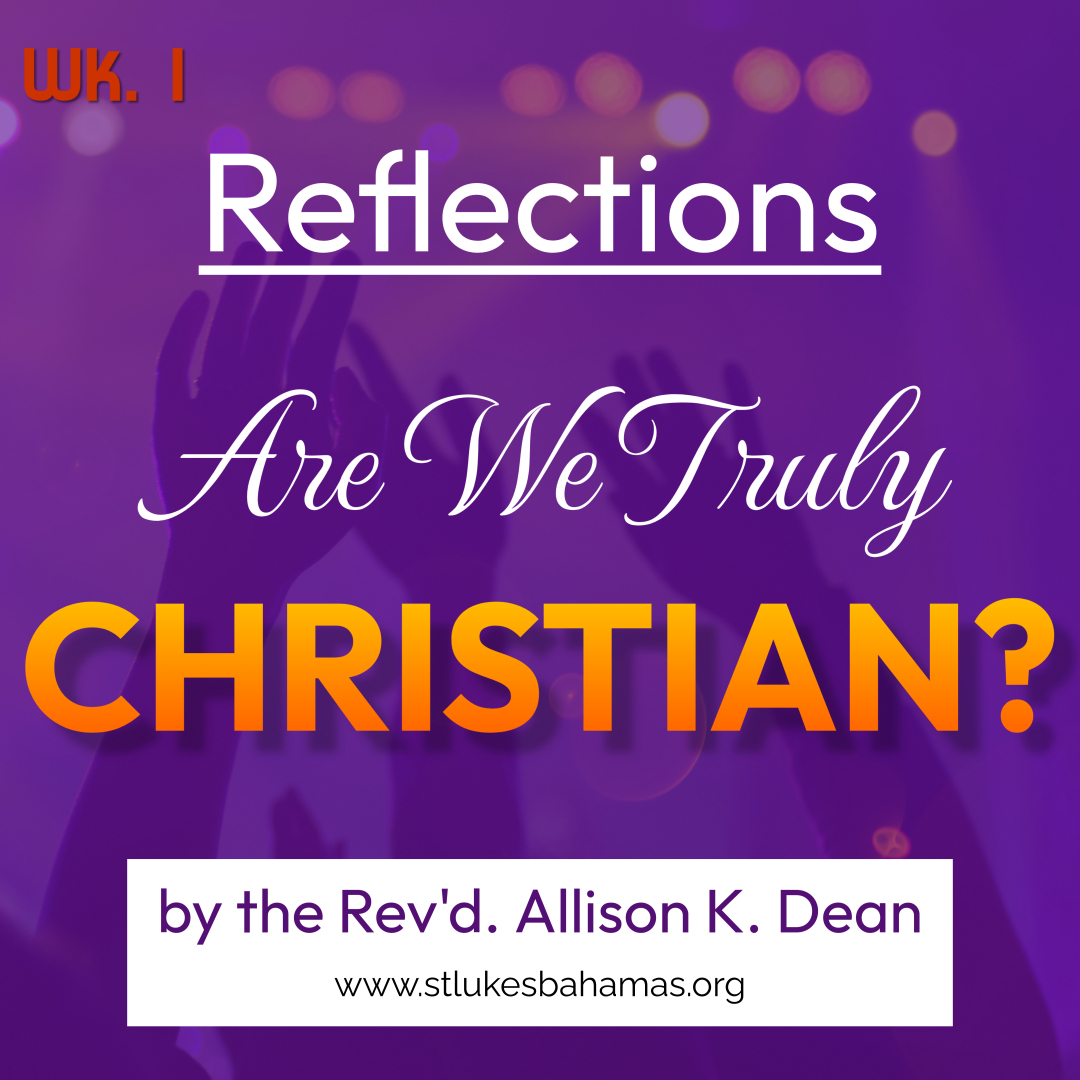ARE WE TRULY CHRISTIAN? Week 1
Reflections by the Rev’d. Allison K. Dean
Listen to this reflection here.
The second installment of this series is here.
When I first started writing reflections for the parish website it was really just part of my Lenten spiritual discipline. Then, since I’d enjoyed the process (even when the writing itself was hard), and there was a reasonable amount of engagement from those that read, I decided to add Advent, Christmas, and Epiphany reflections to the mix. Then in July I felt the urge to do a summer series. But I had a lot of trouble writing. Apart from being very busy and very tired, what was I going to write on/about? Answering that question turned out to be a longer and more complicated process than I’d anticipated. It was only in the process of writing this reflection that the direction became clear. And let me tell you, that where I ended up has very little to do with where I started. But that’s how it is sometimes. I simply pray that the Spirit guides it all.
What follows is the first in a series of reflections on the idea that we are a Christian nation and what it might look like if we actually were.
If you missed this year’s Lent and Easter reflections you can read/listen here: Lent and Easter 2025 | St. Luke’s Parish
A Christian Nation………???
Here in The Bahamas and the Turks and Caicos Islands we are wrestling with worsening tensions over immigration, a sharp increase in violent crimes, abuse, a failing educational system, rising poverty rates, mental health crises, and dysfunctional families. I live and work in Eleuthera, so I know that even outside of Nassau (and Provo) there is some level of social deterioration.
In the face of such challenges many people are shouting for the Church to do something, even claiming that the Church isn’t doing anything at all. But that’s not true. Certainly, in our diocese we have been doing many things at the diocesan and parish levels:
- Free virtual parenting classes (recognised by Social Services)
- Mentorship programmes
- Counselling for perpetrators of sexual violence
- Partnership with the Bahamas Crisis Centre to train persons in recognising and responding to abuse
- Feeding programmes
- Homework and learning centres
- Community bands
- Financial literacy workshops
- Youth groups, men’s groups, women’s groups, prayer groups
- And of great importance – calling people to worship and fear the Lord
But so many people, including those who claim membership in some church or other, aren’t interested in what the Church has to say about how we ought to live our lives. Free food, yes! Free clothes, sure! Money to pay bills, thanks very much!
Do the job you’re being paid to do without expecting bribes and “tips” – mind your own business.
The proper context for sex and child rearing is marriage – this is my life, and I’ll do what I want.
The truth is that we can have the most well-run and well-funded programmes in the world, and it will not make a difference if we don’t change who we are as people. There is an old gospel song that says, “we must change the way we walk, we must change the way we talk, we must live a life that’s pleasing to our King…” That King being Jesus, of course.
We love to blame the government right alongside the Church, and yes, there are policies and laws that can and should be put in place to address our many problems. But whether they are PLP, FNM, or COI in The Bahamas, PNP or PDM in Turks and Caicos, know this: the politicians cannot save us.
What we need is for our cousin who works in the Road Traffic Department to stop selling licence discs and driver’s licences to people who shouldn’t have them.
What we need is for our childhood friend to stop bumping people off their flights so we, who are last-minute, could get a seat.
What we need is for you and me – who are being paid to work from 9am to 5pm – to stop showing up at 10am, taking an hour to eat breakfast, taking a two-hour lunch, and having a bad attitude when serving the public.
Even on the touchy subject of immigration – we complain about the numbers and character of Haitians (and others) but will be the first people to exploit them for cheap labour.
In a 2007 sermon Archbishop Drexel Gomez said, “If we wish to make our country the greatest little country in the world, we need to make it a place where Christian values are not just preached about but are lived and practiced on a daily basis.”
You see, in the end, there is no substitute or workaround for us the people, the citizens and residents of our two countries, simply being better people and living lives of holiness and righteousness.
We would go a long way toward addressing our many problems if even only the churchgoers among us, those of us who claim to be Christian, lived as Christians ought.
Now, don’t get me wrong. I’m not trying to brush aside the very real complexities of our present situation. The impact of colonialism and racism, the drug trade, economic oppression and marginalization, social media, and other forces continues to shape our reality. But we are not little children anymore. At what point do we stop and ask ourselves who it is we want to be?
Are we truly “a Christian nation?”

